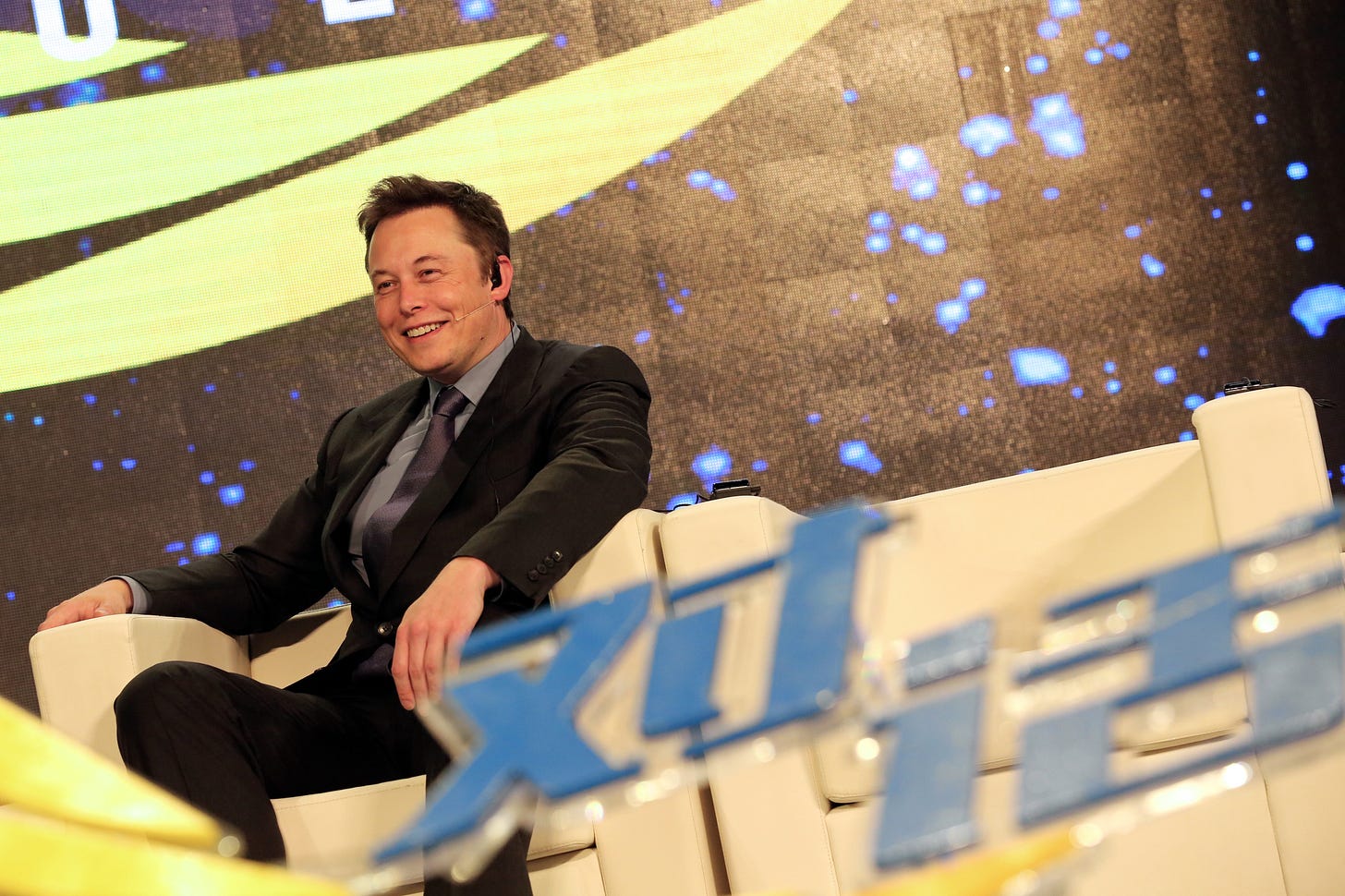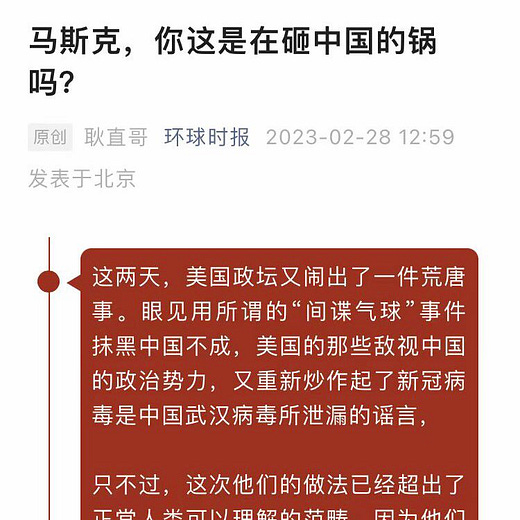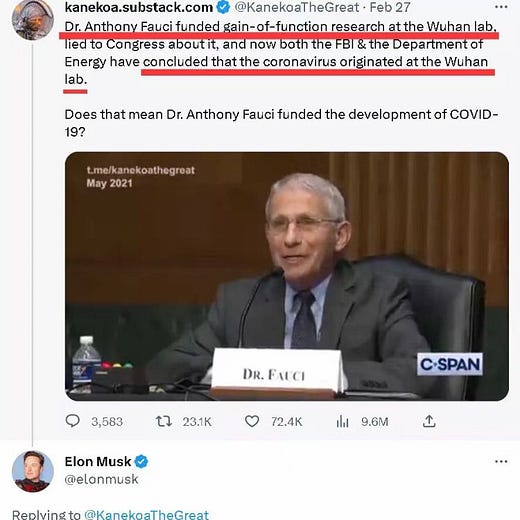From TikTok to Tesla: Congress Warily Eyeing U.S.-China Business Relations
Plus: Chris Christie’s visit with skeptical New Hampshire Republicans.
Good afternoon, Press Pass readers. Today we’re examining the way Congress’s mounting pressure on U.S. companies to move operations outside of China, for both human rights and national security-related reasons, factors into Elon Musk’s behavior and business interests.
As Congress and especially the new House China Committee have undertaken a public reevaluation of the Chinese-U.S. relationship, they have held hearings, introduced legislation, and begun to urge American companies in almost every industry to divest from and ultimately become independent of China. The concerns being voiced by the new committee are particularly relevant to one individual: tech entrepreneur and cringe poster Elon Musk.
Musk’s considerable business interests in China have occasionally put him in hot water with both U.S. lawmakers and the Chinese propaganda machine. Here are some examples:
In 2019, Tesla opened an enormous independent factory reportedly employing some 15,000 people in Shanghai. During the pandemic, it was among the first few hundred companies allowed to reopen during the city’s strict lockdowns. China produces roughly half of Tesla’s cars and its market makes up about a quarter of the company’s revenue.
At the end of 2021, Tesla opened a showroom in Xinjiang, the region in China where the state is conducting its ongoing genocide of Uyghur Muslims, around 100,000 of whom have been forced into slave labor, according to the U.S. Department of Labor’s Bureau of International Labor Affairs. The showroom opening prompted a letter of protest from several Democratic members of Congress.
Musk said in a Financial Times interview last fall that China would be smart “to figure out a special administrative zone for Taiwan that is reasonably palatable, probably won't make everyone happy.” The comment drew sharp criticism from Taiwanese officials and representatives, who called his proposal “belittling” and accused him of “trading with the devil.” (Unsurprisingly, the Chinese ambassador to the United States, Qin Gang, had a more positive reaction to Musk’s comments.)
During a podcast appearance earlier this month, Steve Bannon called Musk “a total and complete phony” and “owned lock, stock, and barrel by the Chinese Communist Party” for allegedly blocking anti-CCP accounts from Twitter.
When Musk inadvertently angered China by lending credence to the lab leak theory of COVID-19’s origins, CCP propaganda outlets issued a warning to him not to engage with such content lest he upset his governmental benefactors:
With this context in mind, I asked around the Hill for perspectives on Musk’s business entanglements with and apparent obsequiousness toward the Chinese.
Kentucky Rep. Andy Barr, a Republican on the China committee, told me “the default rule should always be that we are open for trade for cross-border capital flows,” but added the caveat that there should also be a serious “decoupling.”
“The decoupling that needs to happen needs to be strategic, targeted, and focused on national security,” he said. “We should not be decoupling across the board; we should be decoupling very strategically, in a very targeted way, and not in a way that actually undermines the economic prosperity of American businesses. OK, so my view might be a little different than other members of the select committee.”
Barr added that the business done by companies operating in Xinjiang is in a separate category from the rest of U.S.-China trade relations.
“Now, that’s not to say, you know, Nike or some other companies should be sourcing from slave labor,” Barr said. “Or a solar company should not be sourcing from slave labor in Xinjiang. . . . Human rights matters matter as well. But Kentucky bourbon exports into mainland China [don’t] hurt American national security.”
Rep. Dan Newhouse of Washington, also a Republican, told me the United States cannot afford to be reliant on China for electric vehicle materials such as lithium (Musk inked a deal with Chinese lithium producer Ganfeng Lithium in 2021).
“If the United States wants a clean energy future, we’ve got to be able to be more reliant on domestic sources for some of these critical minerals that are in these cars,” said Newhouse, who serves on the Appropriations Committee’s homeland security subcommittee. “And being dependent on China for a lot of these things puts us, I think, in a very precarious position strategically. So we’re going to be looking at all those kinds of relationships.”
In the Senate, Marco Rubio told me battery supplies are a major concern, but he doesn’t place it as high on his list of security risks as other industries.
“There’s a hierarchy of national security concerns, batteries are a part of it,” he said. “I think there are others, like in technology, that are a little higher. But nonetheless, I mean, it’s concerning.”
A chief concern for Rubio is TikTok’s continued operation in the United States, about which he painted a terrifying picture of a full-scale war with the Chinese:
The real concern is that, listen, if we ever get into a war, God forbid, with the Chinese, they’re going to blow up aircraft carriers, they’re going to try to shoot down, attack our satellites, they’re going to use cyber attacks to bring down our electric grid. But we don’t think that they would weaponize the biggest social media app in the country to create divisions in the country and drive narratives that undermine our will to fight. We’re out of our minds if we think they won’t do that.
As I covered last week, momentum is slowly gathering in Congress to address TikTok. For companies like Tesla—and the countless others whose business relies heavily on China—congressional action on TikTok could be a harbinger of a wider effort to change how American firms do business with China.
Chris Christie does New Hampshire
If former New Jersey Gov. Chris Christie is gearing up for a presidential run, as it appears from the fact that he’s been visiting New Hampshire and engaging with early primary voters, he doesn’t exactly start on a good foot with voters looking for an alternative to Trump. In his today’s Triad, JVL highlighted this striking exchange reported in Semafor:
“I’m glad to hear you standing up against Trump,” the person said, but “when the results came in, you jumped ship on us.”
“Let me explain. Let me explain 2016 to you,” Christie responded. “I’ll be honest with you. We all made a strategic error … I stayed with him in 2016 because I didn't want Hillary Clinton to be president.”
“None of us knew what kind of president he really would be or not,” Christie added.
“I did,” the attendee replied.
As JVL notes in his blistering critique, Christie’s most recent attempt at being a MAGA critic is unconvincing in light of his role in elevating Trump and without any indication he would oppose him if he is once again the GOP nominee. Read the whole thing.







I like how Marco believes that China needs TikTok to sow division in the US when Fox News exists.
I get the reason for the strategic China divestiture.
Just generally speaking, though, the surveillance capitalism and disinformation-spreading that our home-grown tech companies do is a larger problem to me than TikTok, in the same way that white Christian nationalists doing terrorism in this country is more immediately concerning than the idea of the Taliban doing terrorism here.